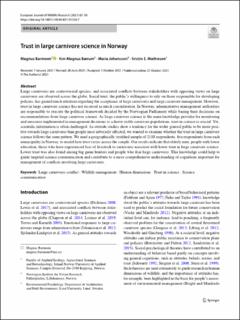Trust in large carnivore science in Norway
Peer reviewed, Journal article
Published version
Permanent lenke
https://hdl.handle.net/11250/2999062Utgivelsesdato
2021Metadata
Vis full innførselSamlinger
Originalversjon
European Journal of Wildlife Research. 2021, 67 (6), 1-13. 10.1007/s10344-021-01538-7Sammendrag
Large carnivores are controversial species and associated conficts between stakeholders with opposing views on large carnivores are observed across the globe. Social trust, the public’s willingness to rely on those responsible for developing policies, has gained much attention regarding the acceptance of large carnivores and large carnivore management. However, trust in large carnivore science has not received as much consideration. In Norway, administrative management authorities are responsible to execute the political framework decided by the Norwegian Parliament while basing their decisions on recommendations from large carnivore science. As large carnivore science is the main knowledge provider for monitoring and measures implemented in management decisions to achieve viable carnivore populations, trust in science is crucial. Yet, scientific information is often challenged. As attitude studies show a tendency for the wider general public to be more posi tive towards large carnivores than people most adversely affected, we wanted to examine whether the trust in large carnivore science follows the same pattern. We used a geographically stratifed sample of 2110 respondents, fve respondents from each municipality in Norway, to model how trust varies across the sample. Our results indicate that elderly men, people with lower education, those who have experienced loss of livestock to carnivores associate with lower trust in large carnivore science. Lower trust was also found among big game hunters and people who fear large carnivores. This knowledge could help to guide targeted science communication and contribute to a more comprehensive understanding of cognitions important for management of conficts involving large carnivores.

